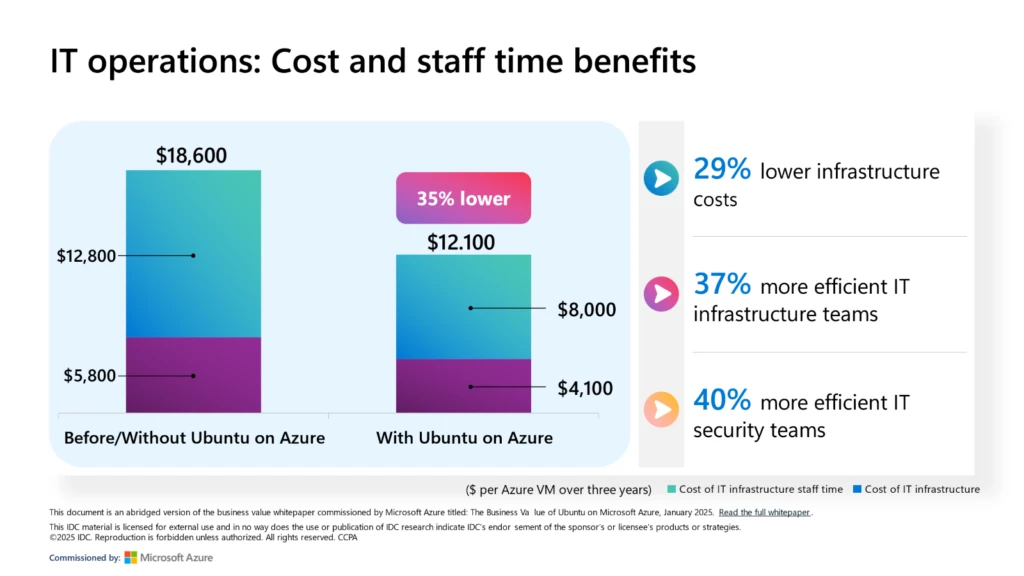The study participants shared that Azure provides a more efficient and efficient platform for its Ubuntu workload, maximizes their value in basic business functions and promotes the acceptance of new technologies.
Today, businesses are under pressure to innovate faster, reduce costs and remain safe, and in preparation for the future controlled A. As part of this shift, many organizations turn to Microsoft Azure to modernize its infrastructure. They find that Azure migration helps to meet these evolving requirements by improving dexterity, strengthening safety and laying foundation.
Microsoft Azure supports your way of migration and modernization with services created for Linux and Open Source. The central point of this transformation is Ubuntu, the distribution of Linux Linux Canonical, which integrates without any problems with Azure’s Iaas and PaaS. Together they provide high performance, commitment and support of the company – plus a wide set of tools to make migration smooth and efficient.
In order to bring the data controller to these advantages, Microsoft entered the International Data Corporation (IDC) to conduct a business value study* based on interviews with organizations that have shifted their workload from intermenis to Azure. The study participants shared that Azure provides a more efficient and efficient platform for its Ubuntu workload, maximizes their value in basic business functions and promotes the acceptance of new technologies. Using data derived from these interviews, IDC analysts created a typical customer profile that would attract common experience and business results. The consolidated data of the participants in the study show that the canonical workload of Ubuntu on Azure brings the following benefits:
- 306% three -year return on investment with 11 -month return on investment.
- 35% lower three -year operating costs.
- 63% quickly deploy new computing resources and 52% quickly scaling of new business opportunities.
- 85% less unplanned downtime of user AFBut.
- The $ 30.63 million returned for an organization for a year.

Quantified benefits of Ubuntu on Microsoft Azure
IDC asked the stakeholders involved in the Ubuntu workload at Azure, an advantage of meaningful behavior that participants quoted, including:
Start the workload of a critical mission with robust performance and flexibility
Organization of workload, such as data analysis, engineering simulation and machine learning, experience increased dexterity and operational effective with Ubuntu on Azure. By using Ubuntu on Azure, businesses can smoothly scal and respond quickly to changing market conditions, ensure optimum application performance when accelerating innovation and holding a competitive advantage.
“We have unlocked AI adoption with Ubuntu on Azure. We can scalance innovations and experience with technology such as Genai, ML and Big Data Analytics without limiting infrastructure. “
Study participants also emphasized the ease of migration of Ubuntu working load on Azure and the ability to add or remove capacity as needed. The profits in dexterity and development were remarkable, and users were able to adapt and scal their Ubuntu Encoliques in Azure quickly and flexibly, reducing friction related to the deployment of development and business activities.
“Scalabibility is one of the reasons why we move to Ubuntu on Azure. Now we have fast scaling and flexible deployment, which is our sensitivity to business needs by almost 40%.”
Strengthen security and strengthen your IT teams
Security was another standout advantage for organizations receiving Ubuntu on Azure. They have experienced increased surgical resistance and decreased exposure to the risks of safety and performance. Azure’s built -in safety tools, including Microsoft Defender for Cloud, offered to detect threats to continuous security and recommendations that can be used. This allows IT teams to actively identify injuries, respond quickly to potential threads and robust maintenance of protection, ultimately promote business continuity and promote customer confidence and parties.
“Ubuntu on Azure provides built -in security features such as Microsoft Defender for Cloud, which is a continuous security and recommendation evaluation that can be done. This proactive approach helps us identify the vulnerability that can be used, which is what we all look for.”
In addition, IT teams were able to move their focus from maintenance of demanding tasks on a more strategic effort for innovation, included in initiatives. Transition to Azure Simplified operations, streamlined developmental cycles, and allowed teams to make faster progress in critical projects using Build-in AOL and infrastructure that promote quick experience and deployment.
“We use AI with Ubuntu on Azure and focus our team. Infrastructure management was difficult, but Azure AI Services has strengthened our applications.
Reduce operating costs on effective scale
The organization also realized that Azure on Azure’s importance is costing cost efficiency. Using Azure As-As-You-go and by removing the maintenance load of hardware, businesses have achieved remarkable savings in infrastructure and licensing savings.
IDC found that customers have reduced Ubuntu working loads by an average of 35% in three years, saving $ 6,500 for Azure VM. Many also recorded a 29% reduction in the annual infrastructure costs, which corresponds to approximately $ 581,100 per year.
“Ubuntu on Azure has reduced our direct costs by 40%and also optimizes our sources allocation, so we have better operational efficiency and saving of employees.”
“Ubuntu on Azure significant offers of cost savings and scalabibility compared to on -site solutions

More information from the IDC study
*IDC White Paper, sponsored by Microsoft, Ubuntu business value on Microsoft Azure, DOC # US52857024, January 2025.

